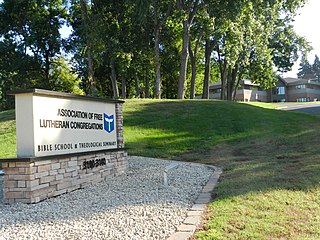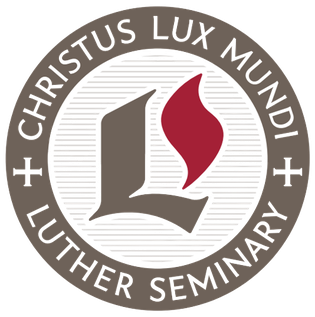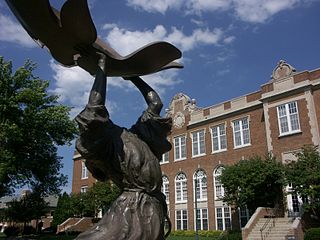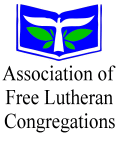
Eau Claire is a city mostly located in Eau Claire County, Wisconsin, of which it is the county seat, and with a small portion in Chippewa County, Wisconsin. It had a population of 69,421 in 2020, making it the state's eighth largest city. Eau Claire is the principal city of the Eau Claire, Wisconsin Metropolitan Statistical Area, locally known as the Chippewa Valley, and is also part of the larger Eau Claire-Menomonie Combined Statistical Area.
The Evangelical Lutheran Church in America (ELCA) is a mainline Protestant Lutheran church headquartered in Chicago, Illinois. The ELCA was officially formed on January 1, 1988, by the merging of three Lutheran church bodies. As of 2021, it has approximately 3.04 million baptized members in 8,724 congregations.

The Church of the Lutheran Brethren of America (CLBA) is a Lutheran denomination of Christians rooted in a Pietist Lutheran spiritual awakening at the turn of the 20th century.

Jefferson Lines is a regional intercity bus company operating in the United States. Their operations serve 14 states in the Midwest and West.

Free Lutheran Bible College and Seminary (FLBCS) is one institution of higher education consisting of two programs, the two-year undergraduate Free Lutheran Bible College (FLBC) and the four-year pastoral training program Free Lutheran Seminary (FLS). FLBCS is accredited through the Transnational Association of Christian Colleges and Schools (TRACS), a member of the Evangelical Council for Financial Accountability (ECFA), and an associate member of the Association for Biblical Higher Education (ABHE). FLBCS is located in Plymouth, Minnesota, near the national offices of the Association of Free Lutheran Congregations (AFLC).
The Lutheran Free Church (LFC) was a Lutheran denomination that existed in the United States, mainly in Minnesota and North Dakota, from 1897 until its merger into the American Lutheran Church (ALC) in 1963. The history of the church body predates its official organization, and a group of congregations that did not join the ALC formed the Association of Free Lutheran Congregations.
Confessional Lutheranism is a name used by Lutherans to designate those who believe in the doctrines taught in the Book of Concord of 1580 in their entirety. Confessional Lutherans maintain that faithfulness to the Book of Concord, which is a summary of the teachings found in Scripture, requires attention to how that faith is actually being preached, taught, and put into practice. Confessional Lutherans believe that this is a vital part of their identity as Lutherans.

The American Lutheran Church (ALC) was a Christian Protestant denomination in the United States and Canada that existed from 1960 to 1987. Its headquarters were in Minneapolis, Minnesota. Upon its formation in 1960, The ALC designated Augsburg Publishing House, also located in Minneapolis, as the church publisher. The Lutheran Standard was the official magazine of The ALC.

The Evangelical Lutheran Synodical Conference of North America, often known simply as the Synodical Conference, was an association of Lutheran synods that professed a complete adherence to the Lutheran Confessions and doctrinal unity with each other. Founded in 1872, its membership fluctuated as various synods joined and left it. Due to doctrinal disagreements with the Lutheran Church–Missouri Synod (LCMS), the Evangelical Lutheran Synod (ELS) and the Wisconsin Evangelical Lutheran Synod (WELS) left the conference in 1963. It was dissolved in 1967 and the other remaining member, the Synod of Evangelical Lutheran Churches, merged into the LCMS in 1971.

Luther Seminary is a seminary of the Evangelical Lutheran Church in America (ELCA) in Saint Paul, Minnesota. It is the largest seminary of the ELCA. It also accepts and educates students of 41 other denominations and traditions. It is accredited by the Higher Learning Commission and the Association of Theological Schools. It also has theological accreditation through the ELCA as well as the United Methodist Church.

Bemidji Airlines is an American airline based in Bemidji, Minnesota, USA. It operates domestic cargo flights, as well as extensive charter and air taxi services. Its main base is Bemidji Regional Airport, with hubs/bases at Minneapolis-Saint Paul International Airport, Denver International Airport, and Fargo.

Paul T. Granlund was an American sculptor. His creative career spanned more than 50 years and more than 650 different works. Most of his work is figurative and made from bronze. His patrons included colleges, hospitals, Lutheran churches, and other institutions.
The Evangelical Lutheran Church (ELC) was a Lutheran denomination that existed from 1917, when it was founded as the Norwegian Lutheran Church of America (NLCA), until 1960, when it joined two other church bodies to form the second American Lutheran Church.
The Upper Midwest Emmy Awards are a division of the National Academy of Television Arts and Sciences. The Minnesota division was founded in 1973. In addition to granting the Upper Midwest Emmy Awards, this division awards scholarships, honors industry veterans at the Silver Circle Celebration, conducts National Student Television Awards of Excellence, has a free research and a nationwide job bank. The chapter also participates in judging Emmy entries at the regional and national levels.
The Northern Great Plains History Conference is an annual conference of history professors, graduate students, historical society experts, and other scholars interested in the history of the Great Plains states of the American Midwest. The Conference features scholarly papers by academics and advanced students on a variety of topics, especially in social history and military history, as well as regional topics regarding the Great Plains.

The Old Apostolic Lutheran Church of America (OALC) is a Firstborn Laestadian church in North America. Firstborn Laestadians are a subgroup within Laestadianism. The Old Apostolic Lutheran Church originated in the 1890s. In the Nordic Firstborn Laestadian revival, the movement works within the official Church of Sweden, which is also called the "Lutheran Folk Church". The Church of Sweden has for a long time recognized the Laestadian movement and has allowed them to hold their own services in the state churches, both before and after the separation of church and state. Even in America it still has a relationship with the Church of Sweden.

The Lutheran Minnesota Conference was one of the 13 conferences of the Augustana Evangelical Lutheran Synod. Formed by Swedish immigrants in the 1800s, it originally encompassed Minnesota, parts of North Dakota, South Dakota, Canada, and Wisconsin. Its size was substantially reduced years later when Alexandria, Fargo, and Red River Districts became the Red River Valley Conference in 1912, and the Alberta District and Canada Mission field became the Canada Conference in 1913. With the creation of the Lutheran Church in America (LCA) in 1962, it became known as the Minnesota Synod.
David Walter Preus was an American Lutheran minister. He served as the last president/presiding bishop of the American Lutheran Church (ALC) from 1973 until that body merged into the Evangelical Lutheran Church in America (ELCA) in 1988.










